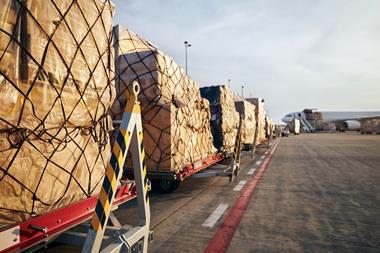
The Cool Chain Association (CCA) has reported that a second trial involving the tracking of perishables during shipping undertaken on its behalf by the Perishable Products Export Control Board (PPECB) has identified significant areas where action can be taken to reduce food loss.
The Cool Chain Association (CCA) is a non-profit organisation bringing together all the links of the temperature-sensitive supply chain that looks to reduce wastage and improve the quality, efficiency and value of that supply chain.
The PPECB tracked a consignments of raspberries, which have a very short shelf life, from South Africa to the UK as part of an ongoing project with the CCA to identify pain points in the cool supply chain, and so then be able to develop best handling practices for perishables.
Owing to their highly limited shelf life, raspberries can only be transported over distance by airfreight, but their delicate nature makes them prone to damage en route.
The goal of the trial is to optimise produce quality in the market by adapting current handling processes and bringing airfreight cold chain management protocols up to the same standard as those for sea freight.
The trial followed an export of raspberries from a farm in Cape Town, South Africa, where some 85% of raspberries are produced for the export market, to the UK.
“Approximately 30% of all berry exports from South Africa to market have quality defects,” informed Vijan Chetty, the PPECB’s general manager and a board director at the CCA.
“In order to mitigate this food loss, we need further research and trials into how handling practices can be optimised,” he continued.
In March, the CCA was involved in a similar perishables study with the PPECB, monitoring the farm-to-table export of cut flowers from South Africa to Europe.
Chetty advised: “The results of our two trials have already highlighted several actionable measures that can be taken to protect product integrity and our continued research will help the CCA to hone a best practise framework to prevent spoilage and waste in the perishables supply chain.”
The trial assessed a number of factors including the quality of raspberries on the farm, temperature management throughout the shipping process, handling processes and a final quality evaluation on arrival at destination.
Not surprisingly, the trial indicated that temperature fluctuations in-flight and during the whole shipping process, while not always completely avoidable, should be minimised.
Future research will see timed temperature tolerance trials performed to determine the duration of exposure to a particular temperature beyond which berry quality and shelf life are compromised.
Plus, additional investigation to measure the internal temperature of the fruit, which changes more rapidly than external air temperature, may also be conducted.
The PPECB’s in-house research department, which analyses quality and food safety standards, is working with the CCA to develop a body of data that can be analysed to develop best practices for the perishables supply chain.










